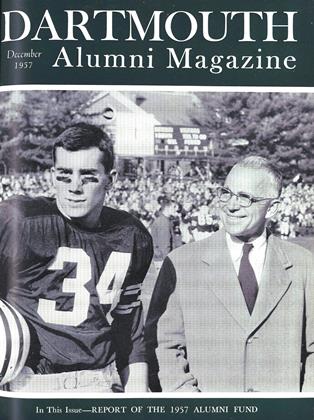By Richard Chase '37. New York:Doubleday Anchor Books, 1957- 266 pp.95¢.
In his. introduction Richard Chase contrasts the "solid moral inclusiveness and massive equability" of the English novel (such as Middlemarch, for example) to be "freer, more daring, more brilliant fiction" of the American romance-novel: The Scarlet Letter,Moby Dick, Huckleberry Finn. Drawing upon the comments of Hawthorne and James on the art of fiction, he defines and describes the romance-novel as containing elements of adventure, melodrama, myth, allegory, symbolism, poetry — in short, of "wildness" - which one does not ordinarily associate with the characteristically realistic novel of the English tradition.
He characterizes the romance-novel as shaped by the contradictions peculiar to our culture - the disparity between ideals and practice, for example, noted by Tocqueville, and the division of our culture into "highbrow" and "lowbrow," made by Van high-Brooks; and points out that the American imagination has been preoccupied with "the melodrama of the eternal struggle of good and evil," less interested in "reconciliation than in alienation and disorder."
In illustration of his thesis he examines the melodramas of Brockden Brown; Cooper and the Leatherstocking; the limitations of romance in Hawthorne; Melville and MobyDick; the romantic elements in James; the vision of truth, the folk origins, and the mythic significance of Huckleberry Finn; and the naturalism of Norris - more "romantic" than "scientific." He concludes with an analysis of The Sound and the Fury, the most "novelistic" of Faulkner's novels, yet one in which "the element of romance is complexly assimilated and sublimated, so that it becomes a suffused poetry of language, metaphor, and event."
This summary scarcely does justice to Mr. Chase's book, which sets American fiction and the American tradition, with its origins in Puritanism and the frontier, in a fresh perspective. Both the central thesis and Mr. Chases's incidental comments and insights are stimulating.
 View Full Issue
View Full Issue
More From This Issue
-
 Feature
FeatureA Dartmouth History Lesson for Freshmen
December 1957 By FRANCIS LANE CHILDS '06 -
 Feature
FeatureStymied in the Bowl
December 1957 -
 Feature
FeatureClass Achievemts, 1957 Fund
December 1957 -
 Feature
FeatureChairman's Report
December 1957 By William G. Morton '28 -
 Feature
FeatureDevelopment Program Leaders Named
December 1957 -
 Class Notes
Class Notes1952
December 1957 By RAYMOND J. BUCK JR., EDWARD J. FINERTY JR.
STEARNS MORSE
-
 Books
BooksProse Preferences.
NOVEMBER 1927 By Stearns Morse -
 Books
BooksADVENTURES IN WORLD LITERATURE.
June 1937 By Stearns Morse -
 Books
BooksTIME OF YEAR
April 1944 By Stearns Morse -
 Books
BooksTO THE GOLDEN SHORE. THE LIFE OF ADONIRAM JUDSON.
January 1957 By STEARNS MORSE -
 Books
BooksSELECTED PROSE OF ROBERT FROST.
OCTOBER 1966 By STEARNS MORSE -
 Books
BooksEmpty Rooms
September 1975 By STEARNS MORSE
Books
-
 Books
BooksTHE FUNDAMENTALS OF ETHICS
January, 1931 By H. P. Haile -
 Books
BooksEMILY DICKINSON: AN INTERPRETIVE BIOGRAPHY.
May 1956 By HENRY L. TERRIE JR. -
 Books
BooksMARGINS: A SEQUENCE OF NEW AND SELECTED POEMS.
JANUARY 1971 By J.D. O'HARA '53 -
 Books
BooksTHE PAPERS OF DANIEL WEBSTER. CORRESPONDENCE, VOLUME I.
January 1975 By JOHN SLOAN DICKEY '29 -
 Books
BooksJOURNEY OF AN AMERICAN.
July 1957 By PENNINGTON HAILE '24 -
 Books
BooksTHE GREAT DESIGN: TWO LECTURES ON THE SMITHSON BEQUEST
FEBRUARY 1966 By RODERICK NASH

